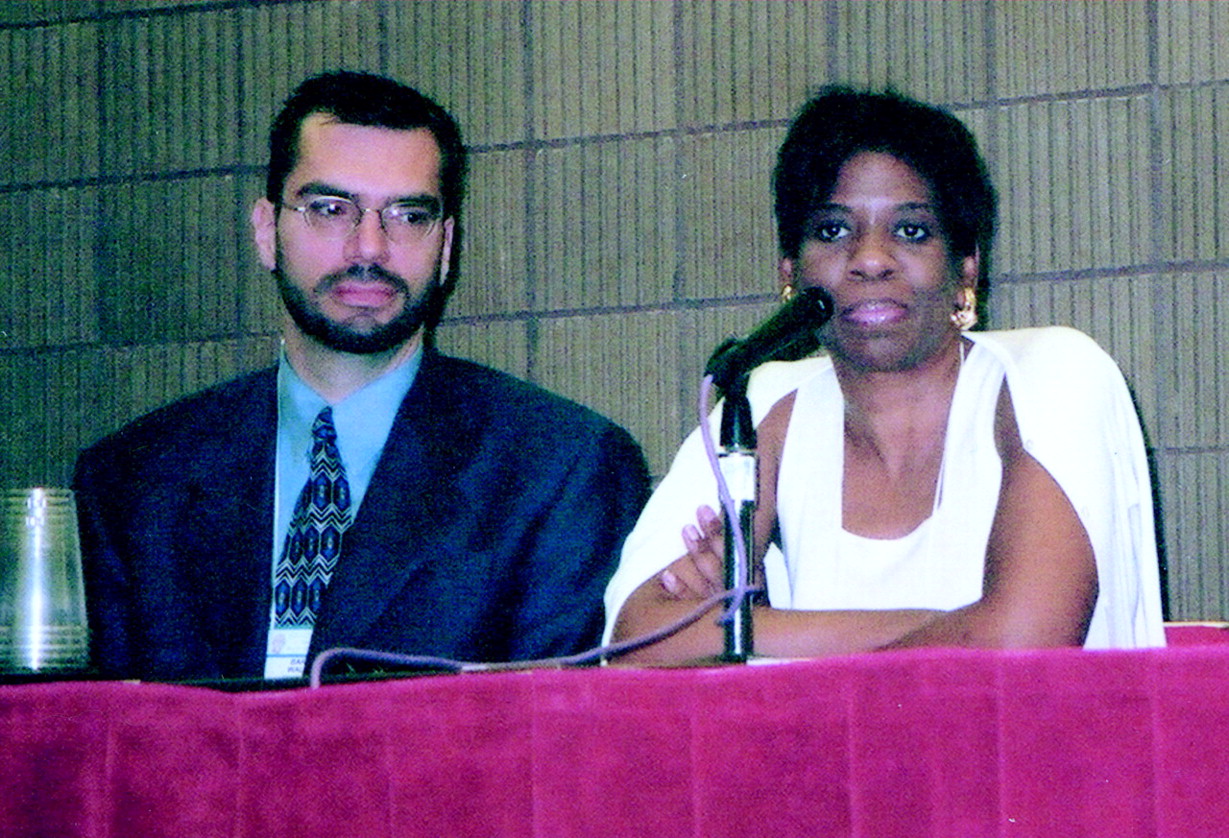Seeking information about career options available in psychiatry, residents and medical students attending a workshop at APA’s 2001 annual meeting came away better prepared to choose the career path best for them.
Barry Wall, M.D., who is the director of forensic services at the Eleanor Slater Hospital in Cranston, R.I., and a private practitioner in Providence, began the workshop with a discussion about forensic psychiatry. Psychiatrists who choose this subspecialty can work either in the private sector, as he does, or the public sector, where common settings include courtrooms, jails, prisons, and hospitals. Although working in state hospitals and correctional settings does not pay well, noted Wall, “the work is extremely important,” because the prevalence of mental illness is higher in correctional settings than in the community. Moreover, there is a great need for assessment and treatment in this underserved population.
In addition, forensic psychiatrists have many opportunities to consult for lawyers and judges, he noted.
Wall cited professional autonomy and the relative absence of managed care in forensic work as some of the drawing cards of the subspecialty. On the down side is short-term consultation work because of the limited time involved in working with patients.
Forensic and Child Psychiatry
Panel member Patrice Harris, M.D., is not only board certified in forensic psychiatry, as Wall is, but also in child and adolescent psychiatry.
Harris, who is an APA trustee-at-large and former Board representative from APA’s Committee of Black Psychiatrists, spoke about where her career has taken her.
“I do forensic work with children and adolescents,” said Harris. There is no shortage of work because, for one reason, “there are a lot of kids being tried as adults.”
Harris, a private practitioner in Atlanta, noted that much of her work is not office based—she is only in her office one day a week. Part of her private practice involves consultation work with social workers.
Harris went to medical school at West Virginia University with her sights set on a career in pediatrics. After she did her clerkship in psychiatry, however, she decided to combine her love for children with a career in psychiatry, she said.
Although Harris observed that medical students and residents thinking about a career in child and adolescent psychiatry are passionate about working with youngsters, they should know that the job entails other work as well.
“Child and adolescent psychiatrists spend a great deal of time and energy talking to parents, other caregivers, teachers, day care providers, and grandparents, for example,” said Harris. These conversations, she said, are necessary for obtaining additional background information about a child. As critical to the system as they are, however, psychiatrists are not always reimbursed for this background work, she pointed out.
Harris cited another major incentive to becoming a child and adolescent psychiatrist. “Since there is no debate that this is a shortage subspecialty,” she said, “you will be in demand, and you’ll have a greater choice of geographic areas in which to practice.”
She added that there is plenty of work to be found in both the private and public sectors for child and adolescent psychiatrists.
Geriatric Psychiatry
Blaine Greenwald, M.D., said that geriatric psychiatry, too, is a subspecialty in dire need of more psychiatrists, and that need will only increase with time.
“Between 1980 and 2020, the general population will increase by about 31 percent, but the geriatric population will increase by 102 percent,” said Greenwald, the director of the division of geriatric psychiatry at Hillside Hospital at Long Island Jewish Medical Center and an associate professor of psychiatry at Albert Einstein College of Medicine. This means that by 2020, 1 in 5 Americans will be over the age of 65.
Among the elderly, Greenwald noted, there is a tremendous incidence of psychiatric disorders, with depression and dementia being two of the most common among the elderly.
In addition to patient care, he pointed out, there is also a great need for research in geriatric psychiatry. Currently, he said, “there is a dearth of good, controlled studies.”
Greenwald himself has gotten involved in geriatric research. For example, he has used magnetic resonance imagining to study structural abnormalities of the brain in people with late-life depression.
He said there is also ample opportunity for geriatric psychiatrists to educate other physicians. “Our primary care colleagues, although well intentioned, are ill informed” about the diagnosis of mental disorders in the elderly and treatment options, particularly in the area of depression.
Addiction Psychiatry
Education is also a large part of the work in addiction psychiatry, according to Petros Levounis, M.D., an assistant professor of psychiatry at New York University and a part-time private practitioner.
Levounis emphasized that people who choose to specialize in addiction psychiatry must have an interest in teaching.
“We must answer a lot of questions from family members, other medical professionals, the media, and society,” said Levounis, “because we are the only subspecialty devoted to treating substance abuse, and there are few of us around.”
He spends much of his time educating fellows, medical students, and residents, as well mental health professionals, at New York University about different aspects of substance abuse.
“We have a program where we teach the evening staff at the hospital about topics such as withdrawal, detoxification, dual diagnosis, and substance abuse in adolescents,” he said.
Despite the great need for addiction psychiatrists, he noted, only 42 people took the 2000 board certification exam, which is given every two years.
The postresidency training for addiction psychiatry involves a fellowship of one to two years, Levounis pointed out, and usually the longer fellowships involve research as well as clinical training.
What Levounis finds particularly gratifying about working in addiction psychiatry, he said, is seeing patients recover from substance abuse.
“Within a few months of someone’s stopping drugs, a different and much healthier person emerges,” said Levounis. “It’s an enriching experience to see someone go through this and know that you helped.” ▪

